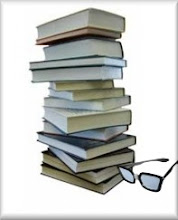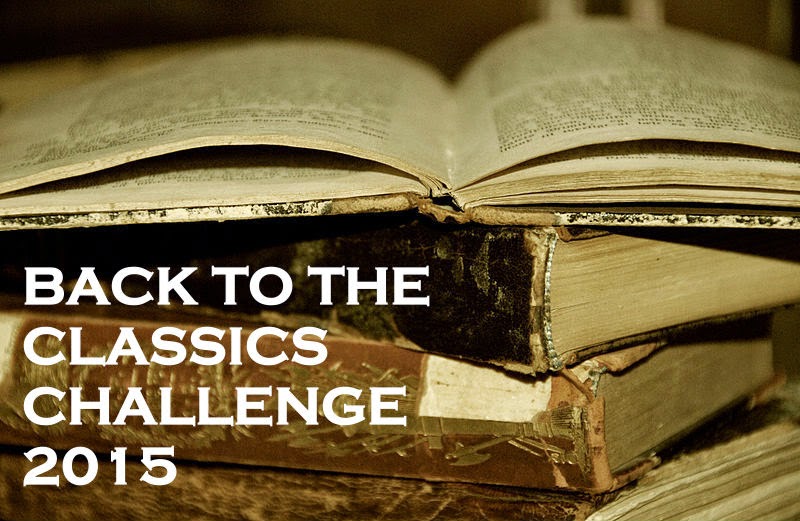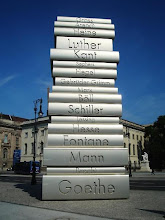 She had, unconsciously, the feeling that any trait of hers, no matter of what kind, was a family tradition and therefore worthy of respect.
She had, unconsciously, the feeling that any trait of hers, no matter of what kind, was a family tradition and therefore worthy of respect.In 1929, German writer Thomas Mann was awarded the Nobel Prize for Literature, mainly for his two epic novels The Magic Mountain and Buddenbrooks. Based on his own family history, Mann's first novel explores the battle that goes on between art and business, duty and desire. One family at the pinnacle of success in 19th century Germany finds itself in a downward spiral that circumstance and their own shortcomings make impossible to stop.
The Plot:
When it comes to success, the Buddenbrook family has it in spades. They are the center of the bourgeois business and social life in their town. Their family firm is thriving and opportunities abound for the four young Buddenbrook children: Thomas, Antonie, Christian, and Clara. Unfortunately, life does not quite turn out the way the way any of them had planned.
After the hard work and prudence of the older generations, the younger ones now live in an age of decadence and extremes. They have known no other life but that at the top of society and it seems incredible to them that that kind of life might come to an end. As the story progresses, we watch each member of the family slowly decline due to pride, ignorance, and intemperance.
My Review (Caution-Spoilers):
As I set out to read my first Thomas Mann novel, I wasn't quite sure what to expect. It is a long book and I was afraid that I might find myself mired down in 700-800 pages of romanticized language and uninteresting characters. Nothing could be further from the truth.
The first thing that I loved about this novel was how accessible it was. I was immediately sucked in to the world of the Buddenbrook family and had a hard time tearing myself away. Not only is Mann's writing style easy to read, but his characters are engaging and interesting. Each one has it's own distinctive personality and complexity and you won't find a single cliche among them. You may hate them, you may love them, but you definitely care about them.
It is also a fascinating glimpse into a time period that I know very little about. Though most of the outside events are given only a mention here and there, there are some major historical events going on. The Revolution of 1848 and it's demands for the freedom of the press are seen through Morten Schwarzkopf, and the Austro-Prussian War and German unification are also touched on. So often when I hear people talk about Germany, it is in the negative light of the world wars. If anything, Buddenbrooks is a glimpse into the true richness and complexity that is German culture.
I read somewhere that in Buddenbrooks, Mann was creating a bridge between 19th century realism and 20th century symbolism. I find this to be a very accurate description. On the one hand, this story is written with all of the frankness of, say, Madame Bovary. Nothing is romanticized and nothing is pathetic. However, it is chock full of symbolism as well. Mann is attempting to portray the ultimate demise of that decadent and glittering society that his parents grew up in. As the story progresses, we see the result that this decadent lifestyle has lead to which is sickness, madness, and death. And it is not just the richness of the lifestyle itself that Mann mocks, but the very basis of it. Throughout the novel, the family and the firm are treated as one and the same. Each personal decision comes down to how that choice will affect the firm. Tony's marriages are all products of trying to help the firm, and Thomas' outward vanity is all a show of the power of the firm. But no matter how hard these characters try to mold their lives around the success of the firm, it all comes to nothing. The firm is dissolved and they meet ends as terrible and lonely as those characters who tried to ignore it. Mann seems to hammer home the idea that some things in this life are inevitable.
Of all of the German literature I read this summer, this one was my absolute favorite. If you're looking for a place to begin in either German lit or Thomas Mann, I would definitely give this one a try. It is a wonderful story that after 100 years is still so relevant to our own times.
The Movie:
As fascinating as this story is, you'll never many (if any) adaptations of it outside of Germany. There are two main versions that I will mention here. The first is the 1979 miniseries that was screened here in the US as part of Great Performances. I was able to see about 4 episodes of it (youtube took it off while I was in the middle of watching it) and I really enjoyed it. The acting and screenplay were spot on with the novel and was really like watching these characters walk right off the page. It is in German, so you will need subtitles, but it is still great watching. I will probably have to break down and get the DVD so that I can finish it.
The other one is the 2008 film version. I haven't seen any of this version, but the trailers make it seem like a glossier version of the story. If you have seen it, please let me know your opinion.
The Plot:
When it comes to success, the Buddenbrook family has it in spades. They are the center of the bourgeois business and social life in their town. Their family firm is thriving and opportunities abound for the four young Buddenbrook children: Thomas, Antonie, Christian, and Clara. Unfortunately, life does not quite turn out the way the way any of them had planned.
After the hard work and prudence of the older generations, the younger ones now live in an age of decadence and extremes. They have known no other life but that at the top of society and it seems incredible to them that that kind of life might come to an end. As the story progresses, we watch each member of the family slowly decline due to pride, ignorance, and intemperance.
My Review (Caution-Spoilers):
As I set out to read my first Thomas Mann novel, I wasn't quite sure what to expect. It is a long book and I was afraid that I might find myself mired down in 700-800 pages of romanticized language and uninteresting characters. Nothing could be further from the truth.
The first thing that I loved about this novel was how accessible it was. I was immediately sucked in to the world of the Buddenbrook family and had a hard time tearing myself away. Not only is Mann's writing style easy to read, but his characters are engaging and interesting. Each one has it's own distinctive personality and complexity and you won't find a single cliche among them. You may hate them, you may love them, but you definitely care about them.
It is also a fascinating glimpse into a time period that I know very little about. Though most of the outside events are given only a mention here and there, there are some major historical events going on. The Revolution of 1848 and it's demands for the freedom of the press are seen through Morten Schwarzkopf, and the Austro-Prussian War and German unification are also touched on. So often when I hear people talk about Germany, it is in the negative light of the world wars. If anything, Buddenbrooks is a glimpse into the true richness and complexity that is German culture.
I read somewhere that in Buddenbrooks, Mann was creating a bridge between 19th century realism and 20th century symbolism. I find this to be a very accurate description. On the one hand, this story is written with all of the frankness of, say, Madame Bovary. Nothing is romanticized and nothing is pathetic. However, it is chock full of symbolism as well. Mann is attempting to portray the ultimate demise of that decadent and glittering society that his parents grew up in. As the story progresses, we see the result that this decadent lifestyle has lead to which is sickness, madness, and death. And it is not just the richness of the lifestyle itself that Mann mocks, but the very basis of it. Throughout the novel, the family and the firm are treated as one and the same. Each personal decision comes down to how that choice will affect the firm. Tony's marriages are all products of trying to help the firm, and Thomas' outward vanity is all a show of the power of the firm. But no matter how hard these characters try to mold their lives around the success of the firm, it all comes to nothing. The firm is dissolved and they meet ends as terrible and lonely as those characters who tried to ignore it. Mann seems to hammer home the idea that some things in this life are inevitable.
Of all of the German literature I read this summer, this one was my absolute favorite. If you're looking for a place to begin in either German lit or Thomas Mann, I would definitely give this one a try. It is a wonderful story that after 100 years is still so relevant to our own times.
The Movie:
As fascinating as this story is, you'll never many (if any) adaptations of it outside of Germany. There are two main versions that I will mention here. The first is the 1979 miniseries that was screened here in the US as part of Great Performances. I was able to see about 4 episodes of it (youtube took it off while I was in the middle of watching it) and I really enjoyed it. The acting and screenplay were spot on with the novel and was really like watching these characters walk right off the page. It is in German, so you will need subtitles, but it is still great watching. I will probably have to break down and get the DVD so that I can finish it.
The other one is the 2008 film version. I haven't seen any of this version, but the trailers make it seem like a glossier version of the story. If you have seen it, please let me know your opinion.
















No comments:
Post a Comment